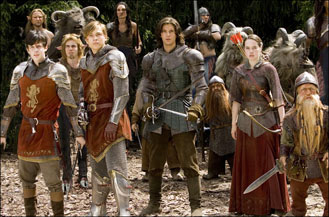|
|
Chapter Two: Prince CaspianBy Brett BeachJuly 22, 2009
Since the Narnia stories take place in different epochs, with recurring characters in some and all-new ones in others, perhaps they aren't all meant to make the leap to the big screen. Not that this will prevent them from being adapted, of course (a certain level of diminishing box office returns needs to be reached for that to happen.) It will become obvious with future Chapter Two columns - if not already - that science fiction, fantasy and speculative fiction are quite my favorite genres. On a case by case basis, I can appreciate and evaluate (although to offer the exception that proves the rule, my favorite TV show of all time is about a certain vampire slayer, so go figure) and Prince Caspian is an enjoyable and exhausting epic, with the hundreds of millions, as they say, up on the screen. If it winds up as just slightly more than that, it's not a blasphemy against the filmmakers or the source material (Lewis had little concern, as I recall, with devoting the lion's share of his prose to extended metal clanging.) What will stand out for me in the end, what I hold on to with a pang of melancholic regret at what Prince Caspian might have been, is the White Queen's plaintive hand, outstretched and grasping towards the unleashing of unimaginable horrors, and of the actress behind the hand, a spy hidden in plain sight, embedded in the middle of a billion dollar franchise. I will take my subversive pleasures wherever I can.
|

|
|
|

|
Friday, November 1, 2024
© 2024 Box Office Prophets, a division of One Of Us, Inc.


